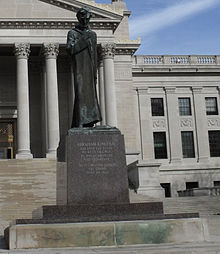Abraham Lincoln Walks at Midnight

"Abraham Lincoln Walks at Midnight" is a 1914 poem by American poet Vachel Lindsay. It portrays Abraham Lincoln walking the streets of Springfield, Illinois, stirred from his eternal sleep, a man, who even in death, is burdened by the tragedies of the modern world. At the time the poem was written, Lindsay was oppressed by knowledge of the blood and death exacted by World War I.
A statue by sculptor Fred Martin Torrey of Lincoln at the West Virginia State Capitol, placed alongside the Kanawha River, portrays Lincoln as he is described in the poem. Lindsay's name is inscribed at the base of the statue.
The poem was included in Louis Untermeyer's anthology, Modern American Poetry, published in 1919 (see 1919 in poetry).[1] This poem is now used in many schools and districts as an inspirational figure of the Civil War, as well as United States history.
In 1953 composer Roy Harris wrote a chamber cantata based upon this poem.
Statue
Sculptor Fred Martin Torrey, born in Fairmont, West Virginia on July 29, 1884, specialized in depictions of Abraham Lincoln. Educated in the Fairmont schools, Torrey left West Virginia in 1909 to enroll at the School of the Art Institute of Chicago. He studied there with the renowned sculptor Lorado Taft. Torrey met his wife, Mabel Landrum Torrey, also a sculptor, at the Institute.
Torrey's 1933 statue, Lincoln Walks at Midnight, was displayed as a 29-inch bronze at the 1939 World's Fair. In 1974 a nine-and-one-half foot bronze casting of the statue as executed by Charleston artist Bernard Wiepper was erected near the West Virginia state capitol. Torrey's 42-inch plaster model of the sculpture is in the possession of the State Museum.
Torrey sculpted other historic figures as well, including Stephen Douglas, George Washington, and George Washington Carver. One of his last works was a 1965 bust of John F. Kennedy. Torrey died in Ames, Iowa, July 8, 1967.
See also
References
- ^ Web page titled "Modern American Poetry/Edited by Louis Untermeyer", (with related pages giving the full content of the volume) at Bartleby.com website, retrieved February 21, 2010
